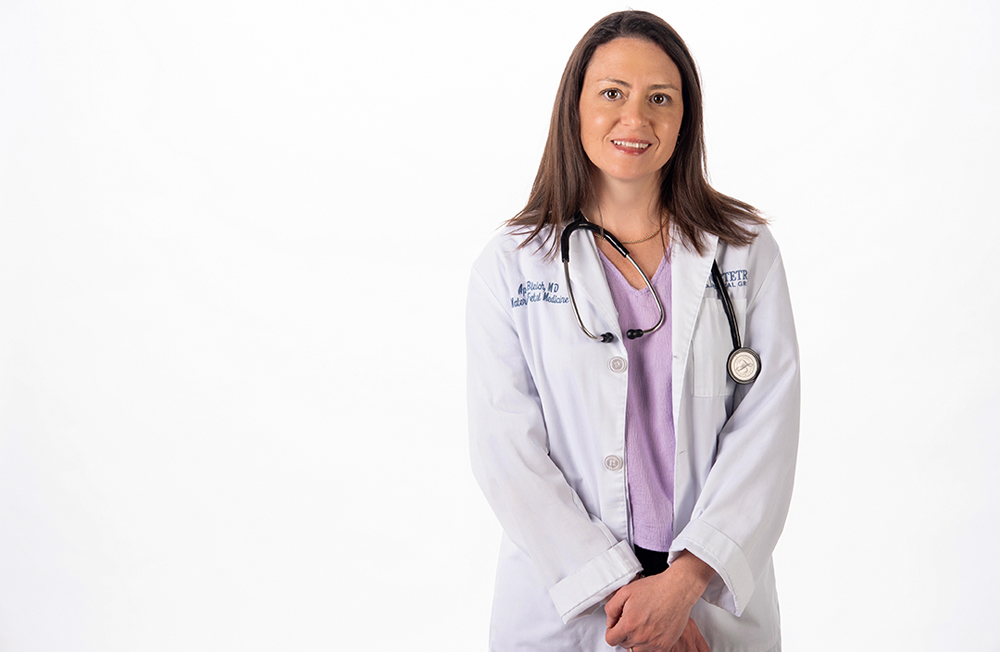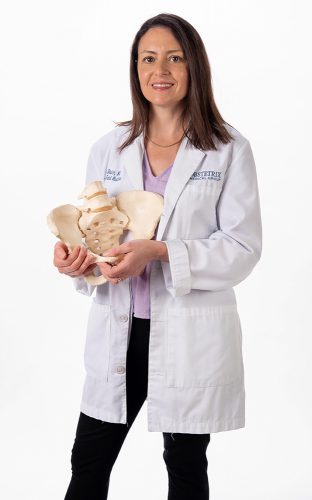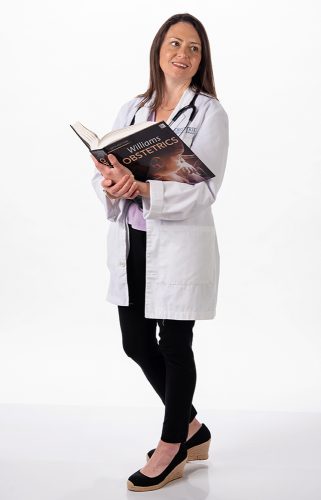A Role Model for Women in Medicine
OB-GYN chair April Bleich prepares future doctors for a lifelong journey with their patients.

OB-GYN is more than just pregnancy, department chair April Bleich says. Photo by Glen E. Ellman
A Role Model for Women in Medicine
OB-GYN chair April Bleich prepares future doctors for a lifelong journey with their patients.
At the TCU and UNTHSC School of Medicine, Dr. April Bleich is department chair of Obstetrics & Gynecology, where she oversees faculty recruitment and retention. Bleich also is the medical director for Maternal Fetal Medicine at Andrews Women’s Hospital at Baylor Scott & White Health All Saints Medical Center – Fort Worth, where she cares for women in high-risk pregnancies. In addition, she serves on the hospital’s executive committee and is a part of Obstetrix Medical Group of Texas.
As the department chair of OB-GYN, how do you envision your role shaping the experience of the medical students to become Empathetic Scholars®?

April Bleich, OB-GYN department chair, is training future doctors to see their patients’ whole story. Photo by Glen E. Ellman
One of the unique things about obstetrics and gynecology is that you get to walk through life-changing events with a patient. It could be the birth of a child or possibly the death of a child or a miscarriage. We experience a lot of journeys with these patients, and my hope is that our students can get a glimpse into that relationship. By watching our faculty members and learning how to have those sometimes very delicate conversations with patients, they can learn to model that behavior throughout their careers, whether they choose to go into OB-GYN or an entirely different field.
You were the first female department chair at the TCU and UNTHSC School of Medicine and now there are two. How important is it for women to be in senior leadership roles in medical education?
I think it’s hugely important for medical students to be able to have mentors who are similar to them, whether that be a female department chair or a minority as a department chair. A lot of times you don’t really see diversity at the level of a department chair. Nearly 50 percent of our class is women. I think it shows them they can accomplish anything, and they are not limited to a certain role. My hope is that I can offer a little bit of a different perspective too.
In 2020, women made up 53.4 percent of applicants, 53.6 percent of applicants accepted into medical school and 51.5 percent of total enrollment. It is the second year in a row that women made up the majority of all three groups, according to the American Association of Medical Colleges. Why is that important for medical education and medicine as a whole?
I think a lot of it has to do with opportunity.
When you see women physicians, then women know they are capable of achieving that goal. Even when I went through my medical training, I had a lot of concerns about my ability to be a good mother and be a physician and have a career. I had to meet with mentors and have that reassurance that, “Yes you can really accomplish this.” You can be a good doctor and still be a good mom; you don’t have to pick one. I think as more and more women have gone into medicine, you see a little shift in terms of that work/life balance.
I also think the younger generation is more demanding of having a healthier work/life balance than we did historically.
In medicine in general, I think it also helps our patients. Sometimes patients, especially in the world of gynecology, a lot of things they have to discuss are very sensitive, and a lot of women don’t talk about women’s health. What I hope is that it becomes OK to have open and frank discussions about women’s health.
What is the most important thing you want the medical students to carry with them through school and beyond about caring for women?
I think the biggest thing is the recognition that women’s health is different than men’s health. There are conditions that are unique to women and not just pregnancy. Things like cardiovascular disease are not unique to women, but have a huge impact on women.
We want to make sure the students are aware of health conditions that can impact women, that they are aware of how to identify them and then be able to care for women’s health throughout their lives.
“We want to make sure the students are aware of health conditions that can impact women, that they are aware of how to identify them and then be able to care for women’s health throughout their lives.”
April Bleich
Communications training is one of the pillars of the medical school and is embedded throughout the curriculum. How important is communication for physicians?
I think it’s huge. Even in my residency I had no formal training on how to deliver difficult news. I was not trained to have those empathetic conversations with patients and how to pick up on patient cues, which is a lot of it. Then also learn how to use those cues to drive your discussion. I think it’s hugely valuable, no matter what medical field they choose to go into, because as a physician, at some point in your life, you’re going to have to deliver difficult news. We’re picking students we know have those qualities at baseline, but we’re fostering those skills and developing them. They are going to be better physicians as a whole because of it.
I’ve already seen the value of the communications training in the students that are working with me in the clinics. They pick up on little things. If a patient’s not following her diet like she’s supposed to, they’ll ask questions about her access to food or what her challenges are. I think those things are huge in not just looking at the medical problems, but looking at the patient as a whole being.
You did your residency training and medical fellowship in Texas. How do you feel about the importance of building more graduate medical education opportunities in Texas?
We have data and we know people tend to stay where they complete their residency.
More and more of our students have friends, they have family, they have spouses with jobs in that community while they are in medical school. It’s four years of your life, and you’ve built that community. So to not have to move all the way across the country at that point in your life is really nice. You get to stay in that community with people and hospital systems that are familiar to you. Some people want to branch out and explore and it’s a wonderful time to do that, but other people have situations where it’s better that they stay local.

On of the goals of the TCU and UNTHSC School of Medicine is for all medical students to have the opportunity to experience OB-GYN. Photo by Glen E. Ellman
For me, I thought I would leave Texas to do my fellowship. I was pregnant, and I was really fearful of going across the country. My husband would have to find a whole new job, and I wouldn’t have any support system outside of the two of us.
The other thing I think is important about undergraduate and graduate medical education is that it elevates the quality of care in the community as a whole. For all of us that are educators, these students keep us on our toes and keep us practicing medicine at the top of our game.
What’s a cool thing about being an OB-GYN that most people don’t know?
I think most people don’t know that OB-GYNs are surgeons, too. We do surgeries like hysterectomies, not just cesarean sections. I get asked that sometimes, “Oh, you actually operate on people, too?” and yes, we do. I think another unique thing about OB-GYN is that whole generational spectrum of care. You can take care of the same patient from the time they are a teenager until the end of their life.
You’re an Austin, Texas, native. What’s your favorite thing about living in Texas?
I love the pride that Texans have about being from Texas. Maybe because it was instilled in me as a child.
I think Fort Worth is kind of like that, too. Fort Worth is this big town with a small-town feel and the cowboy aspect. I like that Fort Worth owns it and embraces it and it’s kind of who we are in this city.
What is it like being a mom and a practicing physician?
It’s a constant juggling act, but I think being a mom has made me a better physician. It really has forced me to be more open about seeing different people’s perspectives. I had pregnancy complications, and my pregnancy did not go the way that I expected it to go. I had a baby in the neonatal intensive care unit. You lose a lot of control during pregnancy and delivery. You can plan and plan as much as you want, but things don’t always go that way. I think I learned a lot about that feeling that you have as a patient, and that feeling isn’t just experienced by patients in pregnancy. That’s a hard feeling to deal with.
What is your own health and wellness routine like?
I find a lot of joy in spending time with my kids.
I live near TCU. I walk around TCU. I like walking outdoors and, honestly, I like being on the campus and seeing the college students out and about. There’s just something that makes me kind of feel like I can live vicariously through the students. Plus, it’s always good to get a little exercise.
I do a lot of puzzles now. It started during the Covid-19 pandemic. It is something I can focus on, and it’s not work. I can just listen to some music, and it helps calm and relax me. I have a hard job. It’s pretty intense some days, and I have to give a lot of bad news, and I have to find a way to re-center myself.
“You can take care of the same patient from the time they are a teenager until the end of their life.”
April Bleich
I can have a little bit of down time where nobody needs anything from me, and I can just focus on something that’s not going to be real demanding. A puzzle is a great way to do that.
Tell us something interesting about you.
I was born at home. I’m an obstetrician, but I was born at home.
The first births I witnessed were women in my family having births at home. I was raised with a very holistic and homeopathic type family. I think it gives me a unique perspective in medicine. It helped me in a way similar to the Empathetic Scholar idea. It helped me see people as a whole rather than as just their medical problem or that everything needed to be treated with medicine. My mom was also a women’s health nurse, so I would spend time in the clinic, and I would read all of her journals. But I did not go to medical school thinking that I would be an OB-GYN. I thought I wanted to be a pediatrician, but I realized that was not the path for me.
I also love the outdoors. I like open spaces. It’s the fresh air. It’s not feeling confined. It’s that feeling that you can just go off and explore on any given trail and not have a fixed thing that you have to do at that moment. I like going hiking, and I grew up rock climbing. I can still climb, and I’m pretty good at it. That’s a little surprising to people, but it’s that ability to have fresh air, green grass, open skies, seeing the trees and the flowers and having endless possibilities of what I get to do with that space.
What’s the best skill you’ve learned during the pandemic?
I got really good at baking during the pandemic because I had time to bake. It’s following the recipe and creating something from nothing, but that’s probably my secret skill — it’s my baking. The things I was most proud of baking were my raspberry scones with a lemon glaze and my grandmother’s coconut cake. Also, it’s not an easy coconut cake to make at all. It has many, many layers, and you have to try to prevent it from caving in, so I was very proud of that. If medicine doesn’t work out, I may have to pursue it a little bit more hardcore.
Editor’s Note: The questions and answers have been edited for length and clarity.

Your comments are welcome
Comments
Related reading:
Campus News: Alma Matters
Dr. Terence McCarthy Leads New Medical School’s Emergency Program
The doctor is the John M. Geesbreght MD, MS, FACEP Chair of Emergency Medicine — the first endowed chair position at the TCU and UNTHSC School of Medicine.
Features
New Fort Worth MD School’s Students Finish First Year
The first year in the lives of six students from the TCU and UNTHSC School of Medicine’s inaugural class was marked by innovation and pivots.